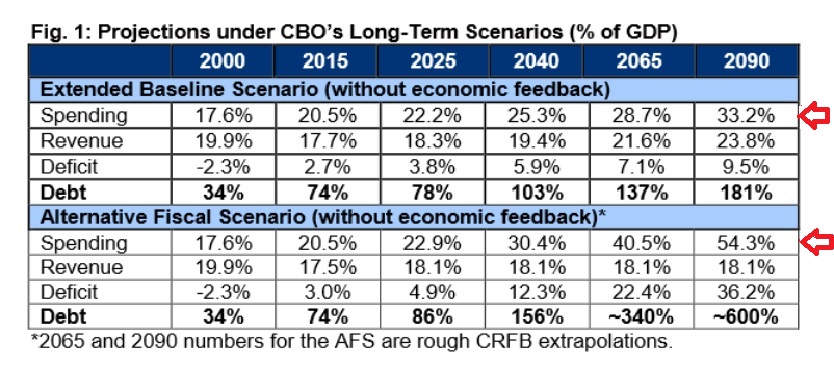

President Barack Obama stands with House Speaker Paul Ryan of Wis. in Emancipation Hall on Capitol Hill in Washington, Wednesday, Dec. 9, 2015, during an event to celebrate the 150th anniversary of the 13th amendment that abolished slavery. (Photo: AP)
If pessimism was an Olympic event, I used to think I might be favored to win a medal. After all, growing levels of dependency outside of Washington and rampant corruption inside of Washington sometimes lead me to conclude that America is doomed to a Greek fiscal future.
rampant corruption inside of Washington sometimes lead me to conclude that America is doomed to a Greek fiscal future.
But compared to some people, maybe I’m just an amateur Cassandra. Or even a Pollyanna.
Holman Jenkins of the Wall Street Journal has an ultra-pessimistic column today arguing that “many of us believe the entitlement programs need to be reformed” but worrying about “Republicans who pose as ‘conservative’ defenders of Social Security and Medicare.”
And part of his column is rather convincing since he points out that Donald Trump has criticized Republicans who favor reform.
…the meaning of Trumpism…goes like this: “…Every Republican wants to do a big number on Social Security, they want to do it on Medicare, they want to do it on Medicaid. And we can’t do that. And it’s not fair to the people that have been paying in for years and now all of the sudden they want [it] to be cut.” Mr. Trump is a political harbinger here of a new strand of populist Republicanism.
To be fair, Trump’s comments aren’t necessarily anti-reform. One could argue that he’s simply saying that benefits for existing retirees and older workers shouldn’t be adversely impacted.
But since “The Donald” hasn’t expressed any support for reforms that would create better and more viable options for younger workers, Jenkins is probably right to be pessimistic.
But he also argues that Tea Party-type Republicans are opposed to reform.
The tea party animus toward ObamaCare is…means-tested new entitlements…are viewed as a threat to the traditional, universal, “earned,” middle-class retirement programs of Social Security and Medicare. …The unspoken tea party stance of defending the good old-fashioned entitlements of “real” Americans is increasingly, in dog-whistle terms, what differentiates one Republican from another.
While it’s almost certainly true that there’s more animosity to redistribution-oriented programs such as Obamacare than there is to so-called earned entitlements, I think Holman misreads the Tea Party crowd.
Based on my speeches to – and other interactions with – these activists, I have never detected any measurable hostility to Social Security reform and Medicare reform. Fixing those programs may not be at the top of their agenda, but they’re not on the wrong side.
Moreover, I work closely with folks on Capitol Hill and I almost never hear about any meaningful opposition from Tea Partiers. And since House GOPers have approved budgets with genuine entitlement reform for five consecutive years, there’s been plenty of time for opposition to materialize.
Jenkins also is glum because Governor Christie, who has openly expressed support for reform, hasn’t fared well. And he notes that Senator Rubio has rejected reforms that would harm current seniors.
Chris Christie, who went nowhere in Iowa, did himself no favor by dragging Social Security and Medicare into every debate, however much those programs need to be addressed. Marco Rubio was just as quick to modify any implication that Republicans therefore are entitlement reformers: “We are talking about reforms for future generations. Nothing has to change for current beneficiaries. My mother is on Medicare and Social Security. I’m against anything that’s bad for my mother.”
I’m not a political expert, so I won’t pretend to know why Chris Christie didn’t get many votes in Iowa, but I don’t think it’s right to label Marco Rubio as an opponent. He’s been very upfront about supporting much-needed structural reform of Medicare and Medicaid. He simply doesn’t want to change the rules for existing retirees and older workers.

You can argue that such a condition makes it harder to save money in the short run, but I’m more concerned about dealing with the long-run fiscal challenge (as seen in these IMF, BIS, and OECD numbers). So Rubio’s position doesn’t strike me as a problem. Indeed, I think he’s pushed the envelope in the right direction, particularly since he comes from a state with so many seniors.
And since Ted Cruz also has said similar things about entitlement reform, that means both top-tier GOP candidates (other than Trump) are willing to do the right thing to restore fiscal sanity.
To be sure, maybe I am being naively optimistic. Perhaps Rubio or Cruz will win and will decide to kick the can down the road, even with a GOP Congress that might be primed for reform.
If that happens and we miss what may be a once-in-a-lifetime opportunity for genuine entitlement reform, I’ll be very unhappy and Holman Jenkins will have demonstrated that pessimism is a much smarter assumption when contemplating the actions of politicians.
In which case my already-low opinion of politicians would drop to a record depth. And it also might be time to escape to a country that still has some sensible people and is less likely to suffer fiscal collapse.






